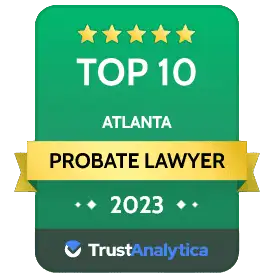Most of us were ready to bid 2021 good riddance and look forward to a more promising year. Unfortunately, 2022 hasn’t exactly eased our anxious minds.
So what’s next? How do we gain some control in a world that’s throwing us one curveball after another?
Tend to your estate plan.
Look, I’m not going to pretend that creating or updating your estate plan will fix everything that’s wrong in our world or even lessen the burden of living through a global pandemic. But an estate plan is within your control. It’s something you can do today to minimize pain and conflict for yourself and your loved ones.
Sometimes just knowing that you’ve taken those steps can provide a very real sense of relief and peace of mind. We can’t control much of what happens in the world or even in our families, but we can plan for it. And 2022 is the year to do it.
Here are the basics:
- If you don’t have an estate plan, make one.
- If you do have an estate plan, review and update it.
- Review and update all your additional documents.
- Know what’s coming and whether it impacts your plans
Create an estate plan
First things first: if you don’t have an estate plan, you need one. One of the many things we learned in 2021 is that unimaginable doesn’t mean impossible. We’ve seen and experienced many things we never believed could happen.
You need to be prepared for the unexpected — not just for your family but for yourself. People generally talk about estate planning as a way to care for your loved ones after your death, and it definitely does that.
But estate planning is about so much more than what happens when you’re gone. Documents like advanced directives and powers of attorney ensure that your interests are protected and your wishes are carried out if you become incapacitated or too ill to care for yourself. You want to ensure that someone you trust (and who knows what your wishes are) is making medical and financial decisions and signing legal documents.
Yes, you want the documents that will protect and support your loved ones. You want a will or a trust. Yes, if you have children, you want to name a guardian. Yes, you want to specify your wishes so that your loved ones have as little conflict as possible.
But remember: it’s not only for them. It’s for you too.
Watch: Why Is Estate Planning Important?
Steps you should take if you already have an estate plan
If you already have an estate plan, congratulations. You’ve taken an important step. But you’re not done yet.
Review your critical documents
Your estate plan is more than a will you write once and shove into a drawer. Your estate plan is a group of documents, and their efficacy will change as your life changes.
If you wrote your will before you started your business, had a baby, divorced your spouse, the will’s provisions may no longer be relevant. Or worse, they could have unintended consequences.
Now is the time to review your will or your trust, your power of attorney, and your medical advance directives. Do they reflect your existing life circumstances and your existing goals?
Watch: How Do You Know When It’s Time to Update Your Estate Planning Documents?
Update your beneficiary designations
Even if you’ve never done a second of formal estate planning (you should get on that), you probably have beneficiary designations.
These are the names you wrote on the applications for your retirement account, your bank account, or your life insurance policy. At the time, you may not have given a lot of thought to the question, especially if you were doing something like signing up for an employer-sponsored 401K during an orientation meeting with HR.
Unfortunately, out-of-date beneficiary designations (like to your ex-spouse or your parents that are no longer living) can create a lot of complications during the probate process. Updating them can feel tedious — you’ll have to contact each account manager — but it’s worth the extra work.
Review your life insurance policy
Life insurance is one of the best ways to ensure that your loved ones are cared for after your death. If you don’t have a life insurance policy, now is the time to get one.
Even if you don’t have a spouse or kids, you may want to get a policy to ensure that your loved ones are able to pay off your debts or pay for your funeral expenses.
If you already have a policy, review the terms. Do you have updated designated beneficiaries? Do the payouts reflect the financial needs of those beneficiaries if something were to happen to you?
Write letters of instruction to your heirs and beneficiaries
Many people have never heard of a Letter of Instruction, but they can be quite useful in the estate planning process. Plus, an update to Georgia law means you can include a letter of instruction with your will and update it whenever you need to without executing a new will.
A letter of instruction is a letter to your heirs or beneficiaries, and it can serve a variety of purposes. On the practical side, the letter can give them basic information for after your death — where you have accounts, what your passwords are, and where to locate certain valuables. It can also provide emergency information, like where your medical records are and how to contact financial advisors.
A letter of instruction can also offer guidance on specific issues or questions you anticipate. For instance, say you’ve named your brother as a guardian for your two young children. If you and your spouse both die, your children will be beneficiaries of a substantial trust and life insurance policy.
Your brother is frugal and conscientious, and you know he would hesitate to use the inheritance funds for things that might benefit his own family and children as well as yours. In a letter of instruction, you might encourage him to use the money to buy a larger house or continue taking vacations — things that will cost more if his family suddenly grows by two members.
Save and share your online passwords
Whether you keep your passwords in a paper notebook or stored in an app, people will need access to them if something happens to you. Make sure you’ve included them in a letter of instruction and have notified your family of its location.
You may also consider including language in your will that gives your executor power over your digital assets. That could mean anything from photos stored online to your social media or bank account passwords. In Georgia, a fiduciary can access some of these (like computer files) but not others (social media accounts) unless they have explicit permission in a will or trust.
Watch: Is a Will Enough During COVID-19?
What’s going to change in 2022?
In 2017, the Trump Administration’s Tax Cuts and Jobs Act increased the lifetime estate and gift tax exemption to $11.58 million per person. That means that right now, a married couple could gift $23 million without paying gift or estate taxes.
The exemption before 2017 was $5 million per person, and President Biden has indicated that he plans to lower the exemption again. The $11.58 million exemption is also set to sunset (aka, expire) at the end of 2025.
Should that matter to you?
It may, or it may not. Many couples don’t think of themselves as “wealthy” or “rich” and are surprised to find that their taxable estate would be more than $10 or 11 million. That means it would have been subject to federal estate tax under the pre-2017 estate tax limits and could be again if the exemption amount changes.
As you’re considering what assets to leave to your heirs (who may have to pay estate tax on them) and what assets to gift now, consider whether changes to the estate tax exemptions may impact your options.
Take control where you can
We’re subject to so many forces that are completely out of our control. Grab onto the things you CAN control, and make them work for you.
Estate planning can be a quick and easy process — with a big dose of peace of mind to follow. And who doesn’t need that right now?
Check all those estate planning tasks off your list. Make an appointment online, and I’ll answer all your questions and walk you through everything you need.








